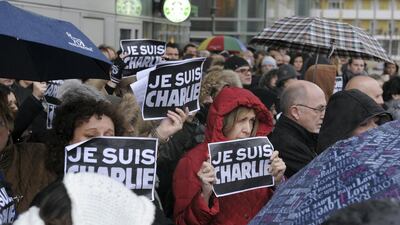Western Europe has faced worse outrages than the massacre at the French satirical magazine Charlie Hebdo – the 191 people who died in the Madrid train bombings of 2004 being a case in point – but there is little doubt that the Paris events will cast a darkening shadow over the continent for years to come.
The Paris attack stands out for many reasons, foremost its ruthless execution. The video of the black-clad assassins calmly delaying their getaway to saunter up to an injured policeman and shoot him dead has brought the incident into every home. While the full truth of their motivation is not yet known, the murderers appear to be far more professional than some of the previous jihadists who have taken up arms against western democracies.
The 2005 bombers who blew themselves up on London Underground trains and a bus have appeared, in the light of subsequent investigation, to be misguided dupes whose plotting was haphazard at best. The Iranian-born man who shocked the city of Sydney by taking hostage the staff and clients of a coffee bar last month was a criminal and a fantasist.
The ruthlessness of Wednesday’s attack inevitably suggests a connection with events in Syria and Iraq, where the well-armed jihadists of ISIL have declared a fundamentalist “caliphate”. The blood-soaked propaganda issued by ISIL has drawn unemployed youths from all over the Muslim world, and increasingly from the disoriented sons (and some daughters) of Muslim immigrants in western Europe.
Several thousand European Muslims are understood to be ISIL recruits, some of them groomed to be suicide bombers. The issue which has occupied security forces is how to stop those who have been trained and indoctrinated by ISIL from returning home to conduct jihad against European targets. Confiscating passports and forcing returning jihadists to undergo deradicalisation programmes are some of the measures being implemented.
Yet it is widely recognised – though politicians cannot afford to say so – that the scale of the problem is unmanageable. The source of contagion, just beyond the borders of Turkey, is just a short distance away. This proximity and the ease of international communication means that Europe is now an integral part of the swathe of war and crisis that is engulfing the Arab world.
Just 10 years ago, things were very different: would-be recruits had to make their way to Pakistan and they could be more easily monitored.
In the aftermath of the London bombings, the British response appeared relatively complacent. Money and resources were thrown into domestic security and forms of house arrest were legalised for suspected radical jihadists. About £80 million (Dh442.8m) was spent on “Prevent”, a series of measures to fight radicalisation and boost social cohesion. Probably most of this money was wasted and many Muslims felt stigmatised.
The British media – usually known for making trouble wherever they can – adopted self-censorship as regards what might be seen as insulting to Islam. While Christianity was mocked, Islam was off limits. Police were accused of turning a blind eye to criminality in immigrant subcultures.
All this is perhaps understandable at times of inter-communal tension. But yesterday a clear link was being drawn between the self-censorship of the British media and the attack of Charlie Hebdo. The provocative cartoons printed in the French weekly would never have appeared in British publications. David Aaronovitch, a columnist for The Times in London, wrote that the reticence of British journalists exposed the French publication to retaliation.
There are many reasons why the softly-softly approach of the British state cannot be repeated now. First, there is no geographical barrier between Europe and the war zones of the Middle East. The connection is given concrete form in the minds of Europeans by pictures of the thousands of migrants who cross the Mediterranean. The jihadists are hidden and no doubt are infinitesimally small in number. But in the minds of Europeans anguished about mass immigration (though most of it is actually from inside Europe) the two are likely to become amalgamated.
The second issue is a pan-European loss of confidence in governments and the ability of the EU to cope with the challenges of globalisation. Seven years after the financial crash Europe suffers from intolerable levels of unemployment, especially among youth, and the long heralded prospect of a return to growth has turned into the nightmare of deflation. All this has led to a rise of populist and xenophobic parties that disguise their racism under the cover of anti-Europeanism.
It is in France that this phenomenon is most clearly seen with the anti-immigrant National Front of Marine le Pen, who is campaigning against the euro, leading the opinion polls against the lacklustre and scandal-hit president, Francois Hollande.
Germany, the most successful economy in Europe, is seeing weekly protests by the anti-immigrant Pegida, though these have been opposed by well-attended counter-demonstrations. There is much that makes no sense here: the biggest Pegida demonstrations are in the city of Dresden, in the economically deprived east, which is practically immigrant-free. So clearly Islamophobia is a rallying cry for broader concerns.
That does not change the reality that all over Europe governments are weakened by populist and insurgent movements that demand an end to business as usual. The danger in all of this is that Muslims feel further stigmatised and isolated. It is up to Muslim communities to speak up against the terrorists. In general this is what community leaders have been doing. But it has to be louder and more forceful to drown out the rising anti-immigrant lobbies.
Alan Philps is a commentator on global affairs
On Twitter: @aphilps

